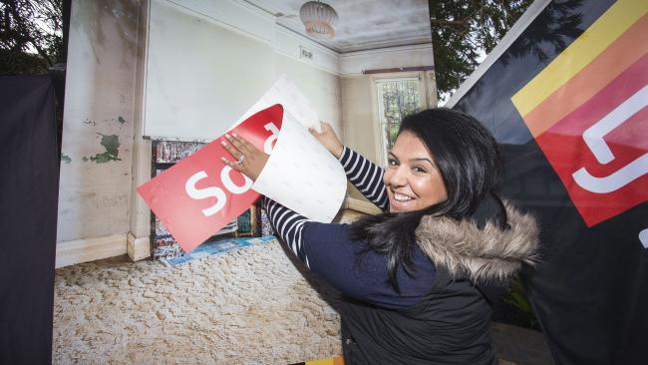Death, divorce, public speaking and … bidding for a property at an auction. For many people, there’s not much more terrifying in life.
There is the fear of being forced to pay more than a property is worth, and also the fear of missing out on a property that definitely suits you.
Buying a property is an emotional experience, because it’s probably the biggest investment you’ll make in your whole life.
Skilled selling agents know this only too well, and they know how to work buyers into an emotional state that only benefits the vendors, that’s the selling agent’s job – actually, their legal responsibility.
There is also the sophisticated auctioneer, who will be working to draw you in, get your confidence, and generate competition among bidders.
The auctioneer is a hired professional, there to work with the team of selling agents on the day to get every dollar they can out of your pocket.
So if you haven’t successfully bid at auction recently, or indeed never before, here are some common mistakes you are well advised to avoid if you intend on owning the property…..without paying too much.

1.Not knowing what the property is REALLY worth.
The most important piece of preparation is to know at what price to walk away from the bidding. It’s an expensive exercise preparing for an auction, and carrying out all the required due diligence to know exactly what you could be buying.
All this expense can be a total waste, if you are never realistically in the running for the property.
You cannot blame the selling agent for quoting a lower price. It’s not really their job to educate you, or advise you. They are paid by the vendor, and have a legal obligation to ensure the vendor gets the best result, not you.
The property value is NOT related to your own personal financial position. It’s rarely worth what you would be very happy to pay. It’s NOT worth what the vendor has decided they want, and unlikely to be worth what the agent is quoting – especially at the start of the sales campaign.
Knowing exactly what the property is really worth, and how to work this out, and fixing your ‘walk away’ price limit is by far the most important item you should know.
2.Arriving underprepared, with no bidding strategy.
Research from lending institutions tell us over 62% of buyers arrive at an auction with little or no bidding strategy in place.
Don’t do this! You are playing right into the hands of the auctioneer, who will find it easy to guide you in a way that best suits the vendor.
Knowing exactly how you plan on bidding, how you will place the bid, the tone of voice you use to place the bid, the tempo you use at different stages of the auction, where you stand in the roomand the body language you use, how you present yourself, and many other small details are finely tuned by professional bidders.
A tried and tested strategy that is well executed, is far better than little, or no plan at all.
3.Being guided by the selling agent and the auctioneer, and pushed to bid above your limit.
The selling agent or the auctioneer doesn’t know your absolute limit you can actually afford to pay (nor should you tell them!) And frankly, they don’t care.
It’s not the selling agent’s responsibility to look after you.
If you purchase at auction, and have paid an ‘emotional price’ for a property, your bank valuation could come in lower than what you have paid. In this situation you may not be able to complete the sale and have to walk away from your deposit.
The agent still gets paid from the deposit that you forfeit, and they will likely get the opportunity to sell the property again. Double commission = happy agent. You can also be sued for any loss the vendor has in this scenario.
If you feel emotionally engaged with the property and there is a chance this might happen, then this is a very strong reason to have someone else who is not emotionally involved in the purchase, and is very experienced in auctions, to bid on your behalf.
4.Hide in the corner at the back of the room during the auction
Rarely does this work. It’s much better to take a position in the middle of the room where everyone can see you. Looking determined, with strong body language is then very important; with decisive movements and everything about you saying, ‘I’m not going to be beaten!’
5.Be hesitant in their bidding
The other bidders can feel your confidence. If you hold back from bidding first, or during the auction, it can send them a message. Many bidders give up well before their limit, and often say things like “They seemed to want the property more than us”, or “they would have just kept bidding”.
In this case, they simply gave up too early. Don’t get psyched out by your opposition. Stay very calm and focused on your plan, your bidding strategy and your limit. Be assertive and confident from the moment you arrive, until the moment you sign the contract.
6.Ask, in the middle of an auction, ‘Is this property on the market yet?’
This is a weak strategy. While it is relevant, it shouldn’t be your focus. The selling agent and vendor will want to do business with someone on auction day, that is what they are all there for. Even if the property gets passed in, if you have been direct and confident during the auction, it actually gives you more strength during post-auction negotiations, than if you decide to hide back and not show your intentions. It’s only a courtesy that the agent talks to the highest bidder first; not law.
If there is active bidding and then it stops at a certain level, a vendor is more likely to meet the market and lower their reserve, than if the bidders hold back and not show their intentions.
7.Letting the property go to auction in the first place
Sometimes a property is required by law to go to public auction. A mortgagee sale, a court order in a divorce or deceased estate are some examples.
However these scenarios are generally few and far between.
With a popular property or in a strong market, a selling agent will often hold buyers back from making pre-auction offers for many reasons.
As mentioned, auctions are highly emotional environments, and not the best environment for buying a major asset in.
If you want to buy the property, and can see it will be popular with other buyers, then take the initiative and secure beforehand. If the property is on the market, then it is there to be bought.
Of course there is a definite process in doing this successfully, and you generally only get once chance to do it correctly.
Most importantly, you don’t need to do this all on your own.
For a very small fee, you can have a professional Buyers Agent bid for you on auction day. Someone who will be on YOUR side.
They can ensure you have a clear strategy beforehand, and of course they will stick to your limit, and hopefully secure for even less. This can take a lot of the stress and emotion away from you, leaving you with a clear relaxed mind to make the best decision and get the best result.
If the property gets passed in, it can be a huge benefit having a professional negotiate on your behalf in this situation also.
Please contact us to discuss further, and to book us in.
